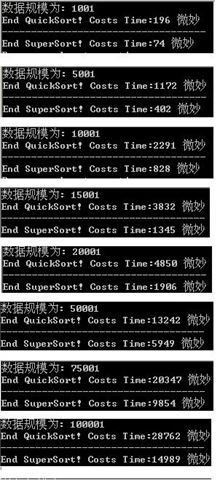- 数据结构奇妙旅程之深入解析快速排序
山间漫步人生路
数据结构排序算法算法
快速排序(QuickSort)是一种高效的排序算法,它使用了分治法的策略来将一个数组排序。其基本思想是选择一个基准元素,通过一趟排序将待排序的数据分割成独立的两部分,其中一部分的所有数据都比基准元素小,另一部分的所有数据都比基准元素大,然后再按此方法对这两部分数据分别进行快速排序,整个排序过程可以递归进行,以此达到整个数据变成有序序列。工作原理选择基准:从待排序的序列中选一个元素作为基准(pivo
- php 把一个数组分成有n个元素的二维数组的算法
风清扬-独孤九剑
phpphp算法
一、第一种解法0){$columns_map[$position]++;//这个地方格外注意,$position与$columns比较$position=($position<$columns-1)?++$position:0;$array_length--;}foreach($columns_mapas$val){$newarray[]=array_splice($array,0,$val);}
- 【算法分析与设计】去除重复字母
五敷有你
算法分析与设计javajavascript开发语言算法数据结构
个人主页:五敷有你系列专栏:算法分析与设计⛺️稳中求进,晒太阳题目给你一个字符串s,请你去除字符串中重复的字母,使得每个字母只出现一次。需保证返回结果的字典序最小(要求不能打乱其他字符的相对位置)。示例示例1:输入:s="bcabc"输出:"abc"示例2:输入:s="cbacdcbc"输出:"acdb"思路贪心+单调栈实现【字符串删除一个字符使其字典序最小的贪心策略】:对于两个长度相同的字符串,
- yarn的安装和使用全网最详细教程
zxj19880502
yarnnpm
一、yarn的简介:Yarn是facebook发布的一款取代npm的包管理工具。二、yarn的特点:速度超快。Yarn缓存了每个下载过的包,所以再次使用时无需重复下载。同时利用并行下载以最大化资源利用率,因此安装速度更快。超级安全。在执行代码之前,Yarn会通过算法校验每个安装包的完整性。超级可靠。使用详细、简洁的锁文件格式和明确的安装算法,Yarn能够保证在不同系统上无差异的工作。三、yarn的
- 图论记录之最短路迪杰斯特拉
Just right
算法图论java开发语言
简述思想这个思想能用一句话来概括,精简到的极致:每次找到一个最短距离的点并更新起点到各个点的最短距离如果要可视化的话,B站搜索Dijksra算法,有视频讲解伪代码写到这里,其实是想整一个动画的,这样效果更好点,但由于种种原因所以就拖一下intdijkstr(){dist[1]=0;其余的点的距离全部初始化为真无穷,不要写成int的最大值迭代n次将不在s中的,且距离最近的点给tsj即先到t,再加上t
- 大创项目推荐 深度学习 opencv python 公式识别(图像识别 机器视觉)
laafeer
python
文章目录0前言1课题说明2效果展示3具体实现4关键代码实现5算法综合效果6最后0前言优质竞赛项目系列,今天要分享的是基于深度学习的数学公式识别算法实现该项目较为新颖,适合作为竞赛课题方向,学长非常推荐!学长这里给一个题目综合评分(每项满分5分)难度系数:3分工作量:4分创新点:4分更多资料,项目分享:https://gitee.com/dancheng-senior/postgraduate1课题
- 排序算法太多?常用排序都在这了,一篇文章总结和实现所有面试会考的排序算法(基于Python实现)
宇宙之一粟
不归路之Python#IT面试题收集与总结数据结构与算法算法数据结构排序算法pythonjava
文章目录排序算法1.常见的排序算法1.1选择排序1.1.1思想1.1.2实现**1.1.3选择排序分析**1.2冒泡排序**1.2.1思想****1.2.2实现****1.2.3冒泡排序分析**1.3插入排序**1.3.1思想****1.3.2实现****1.3.3插入排序分析**1.4归并排序☆☆★**1.4.1思想****1.4.2实现****1.4.3归并排序分析**1.5快速排序☆★★**
- 【数据结构】实验一 实现顺序表各种基本运算的算法
张鱼·小丸子
数据结构实验c++数据结构
题目:实现顺序表各种基本运算的算法要求:1、建立一个顺序表,输入n个元素并输出;2、查找线性表中的最大元素并输出;3、在线性表的第i个元素前插入一个正整数x;4、删除线性表中的第j个元素;5、将线性表中的元素按升序排列;6、将线性表中的元素就地逆序(只允许用一个暂存单元);#include#defineSIZE1000usingnamespacestd;typedefstruct{int*a;//
- python清华大学出版社答案_Python机器学习及实践
weixin_39805119
python清华大学出版社答案
第1章机器学习的基础知识1.1何谓机器学习1.1.1传感器和海量数据1.1.2机器学习的重要性1.1.3机器学习的表现1.1.4机器学习的主要任务1.1.5选择合适的算法1.1.6机器学习程序的步骤1.2综合分类1.3推荐系统和深度学习1.3.1推荐系统1.3.2深度学习1.4何为Python1.4.1使用Python软件的由来1.4.2为什么使用Python1.4.3Python设计定位1.4.
- Element-UI中el-time-picker时间选择器无法选择
爱健身的小刘同学
bugElementVue系列javascript前端elementui
前言前几天开发时,在做一个时间选择时,遇到了无法选中时间的问题在网络上找了解决方法,特此记录一下解决方法我的代码结构营业时间时间选择不上的原因是因为初始值问题很有可能是最开始赋值为空数组了所以有3个解决方法1.设置为nullbusinessTimeInfo:null2.设置当前时间businessTimeInfo:[newDate(newDate()),newDate(newDate())](默认
- Java回溯知识点(含面试大厂题和源码)
一成码农
java面试开发语言
回溯算法是一种通过遍历所有可能的候选解来寻找所有解的算法,如果候选解被确认不是一个解(或至少不是最后一个解),回溯算法会通过在上一步进行一些变化来丢弃这个解,即“回溯”并尝试另一个候选解。回溯法通常用递归方法来实现,在解决排列、组合、选择问题时非常有效。回溯算法的核心要点:路径:也就是已经做出的选择。选择列表:也就是你当前可以做的选择。结束条件:也就是到达决策树底层,无法再做出选择的条件。回溯算法
- 第七章 索引及执行计划,存储引擎
执笔为剑
#MySQL运维篇编辑器mysql
第七章索引及执行计划,存储引擎1,索引及执行计划1,作用:提供类似书目录的作用,目的是优化查询2,所用的种类(根据算法)B树索引Hash索引R树FulltextGIS3,B树基于不同的查找算法分类介绍B-tree:在范围查询方面提供了更好的性能(>showengines;#存储引擎作用在表上,不同的表可能有不同的存储引擎mysql>select@@default_storage_engine;#查
- Java面试题:解释JVM的内存结构,并描述堆、栈、方法区在内存结构中的角色和作用,Java中的多线程是如何实现的,Java垃圾回收机制的基本原理,并讨论常见的垃圾回收算法
杰哥在此
Java系列javajvm算法面试
Java内存模型与多线程的深入探讨在Java的世界里,内存模型和多线程是开发者必须掌握的核心知识点。它们不仅关系到程序的性能和稳定性,还直接影响到系统的可扩展性和可靠性。下面,我将通过三个面试题,带领大家深入理解Java内存模型、多线程以及并发编程的相关原理和实践。面试题一:请解释JVM的内存结构,并描述堆、栈、方法区在内存结构中的角色和作用。关注点:JVM内存结构的基本组成堆、栈、方法区的功能和
- JS判断数据类型
风落不归处
Javascriptjavascript前端
一、typeoftypeof可以检测基本数据类型,但是碰到引用数据类型返回的都是object。typeof通常用来判断基本数据类型,但是用typeof来判断null和引用类型的实例返回的结果都是"object"lets="Nicholas";letb=true;leti=22;letu;letn=null;leto=newObject();functionFn(){}console.log(typ
- 优化选址问题 | 基于和声搜索算法求解基站选址问题含Matlab源码
天天酷科研
优化选址问题(LP)matlab和声搜索算法基站选址问题
目录问题代码问题和声搜索算法(HarmonySearch,HS)是一种模拟音乐创作过程中乐师们凭借自己的记忆,通过反复调整各乐器的音调,直至达到最美和声状态为启发,通过反复调整解向量的各分量来寻求全局最优解的智能优化算法。下面是一个基于和声搜索算法求解基站选址问题的Matlab伪代码框架。请注意,这个框架是一个基本的实现,你可能需要根据你的具体问题和约束条件进行调整和优化。代码%和声搜索算法求解基
- 二叉树|617.合并二叉树
亦小河
算法
力扣题目链接classSolution{public:TreeNode*mergeTrees(TreeNode*t1,TreeNode*t2){if(t1==NULL)returnt2;if(t2==NULL)returnt1;//重新定义新的节点,不修改原有两个树的结构TreeNode*root=newTreeNode(0);root->val=t1->val+t2->val;root->lef
- 单链表的基本操作
stoAir
c++c语言数据结构算法
链表文章目录链表创建链表单链表实现一:实现二:错例循环链表单独创建逐节点创建约瑟夫环问题删除节点实现方式一:实现方式二:删除节点并建立新链表逆置链表实现:链表排序实现一:实现二:实现三:链表查询(跳表)structList{intdata;structList*next;}创建链表单链表实现一:structList*listCreate(){intdata;structList*head=NULL
- javascript的数据类型及转换
田小田txt
一、JavaScript数据类型:共有string,number,boolean,object,function五种数据类型;其中Object,Date,Array为对象型;2个不包含任何值的数据类型:null,undefined。二、Typeof查看数据类型:typeof"John"//返回stringtypeof3.14//返回numbertypeofNaN//返回numbertypeoffa
- 【循环神经网络rnn】一篇文章讲透
CX330的烟花
rnn人工智能深度学习算法python机器学习数据结构
目录引言二、RNN的基本原理代码事例三、RNN的优化方法1长短期记忆网络(LSTM)2门控循环单元(GRU)四、更多优化方法1选择合适的RNN结构2使用并行化技术3优化超参数4使用梯度裁剪5使用混合精度训练6利用分布式训练7使用预训练模型五、RNN的应用场景1自然语言处理2语音识别3时间序列预测六、RNN的未来发展七、结论引言众所周知,CNN与循环神经网络(RNN)或生成对抗网络(GAN)等算法结
- MongoDB聚合运算符:$indexOfArray
原子星
mongodbmongodb数据库
文章目录语法使用举例$indexOfArray聚合运算符返回指定值在数组中第一次出现的索引位置,数组的索引从0开始。语法{$indexOfArray:[,,,]}$indexOfArray参数说明:,字符串,可以是任何能够解析为数组的表达式,如果表达式解析为null或引用的字段不存在,$indexOfArray返回null。如果表达式不能解析为数组或null且引用的字段都存在,$indexOfAr
- 15届蓝桥杯备赛(3)
sad_liu
#sad_liu的刷题记录蓝桥杯职场和发展
文章目录15届蓝桥杯备赛(3)回溯算法组合组合总和III电话号码的字母组合组合总和组合总和II分割回文串子集子集II非递减子序列全排列全排列II贪心算法分发饼干最大子数组和买股票的最佳时机II跳跃游戏15届蓝桥杯备赛(3)提高C++程序的输入输出效率,尤其是在需要大量输入输出操作时。ios_base::sync_with_stdio(false);cin.tie(nullptr);cout.tie
- C#杨辉三角形
wenchm
c#算法数据结构
目录1.杨辉三角形定义2.用数组实现10层的杨辉三角形3.使用List泛型链表集合设计10层的杨辉三角形(1)代码解释:(2)算法中求余的作用4.使用List泛型链表集合设计10层的等腰的杨辉三角形1.杨辉三角形定义杨辉三角是一个由数字排列成的三角形数表,其最本质的特征是它的两条边都是由数字1组成的,而其余的数则等于它上方的两个数之和。杨辉三角有两种常用的表示形式。2.用数组实现10层的杨辉三角形
- 代码随想录 day29 第七章 回溯算法part05
厦门奥特曼
代码随想录算法golang剪枝
491.递增子序列46.全排列47.全排列II1.递增子序列关联leetcode491.递增子序列本题和大家刚做过的90.子集II非常像,但又很不一样,很容易掉坑里。思路不能改变原数组顺序不能先排序去重同一层去重树枝上可以有重复元素新元素添加条件大于等于当前次收集数组最右元素value>array[right]题解funcfindSubsequences(nums[]int)[][]int{ret
- 分布式应用下登录检验解决方案
敲键盘的小夜猫
分布式java
优缺点JWT是一个开放标准,它定义了一种用于简洁,自包含的用于通信双方之间以JSON对象的形式安全传递信息的方法。可以使用HMAC算法或者是RSA的公钥密钥对进行签名。说白了就是通过一定规范来生成token,然后可以通过解密算法逆向解密token,这样就可以获取用户信息。生产的token可以包含基本信息,比如id、用户昵称、头像等信息,避免再次查库,可以存储在客户端,不占用服务端的内存资源,在前后
- 数据结构——单向链表(C语言版)
GG Bond.ฺ
数据结构链表c语言
在数据结构和算法中,链表是一种常见的数据结构,它由一系列节点组成,每个节点包含数据和指向下一个节点的指针。在C语言中,我们可以使用指针来实现单向链表。下面将详细介绍如何用C语言实现单向链表。目录1.定义节点结构体2.初始化链表3.插入节点4.删除节点5.遍历链表6.主函数1.定义节点结构体首先,我们需要定义表示链表节点的结构体。每个节点包含一个数据域和一个指向下一个节点的指针域。typedefst
- 【牛客】SQL148 筛选昵称规则和试卷规则的作答记录
talle2021
MySQL-刷题MySQL数据库
描述现有用户信息表user_info(uid用户ID,nick_name昵称,achievement成就值,level等级,job职业方向,register_time注册时间):iduidnick_nameachievementleveljobregister_time11001牛客1号19002算法2020-01-0110:00:0021002牛客2号12003算法2020-01-0110:00
- MyBatis面试简答题
糯米小麻花啊
mybatis
以下是一份MyBatis的高难度简答题,共20题:请解释MyBatis中#{}和${}的区别,并举例说明它们在实际应用中的使用场景。MyBatis的Mapper接口是如何与XML映射文件关联的?如何在MyBatis中实现动态SQL?请列举几种常见的动态SQL元素并解释其作用。描述MyBatis中的ResultMap的作用,并说明如何定义和使用它。MyBatis如何处理数据库中的null值?请解释M
- C语言之猴子吃桃
普通的一个普通猿
C语言算法c语言算法开发语言
目录一简介二代码实现循环实现递归实现三时空复杂度A.循环实现B.递归实现一简介猴子吃桃问题是一个经典的递推算法题目,它描述如下:一只猴子第一天摘下若干个桃子,当天吃掉了所摘桃子数的一半多一个。之后每天早上,猴子都会吃掉前一天剩下桃子数的一半多一个。直到第十天早上,猴子只剩下了一个桃子。二代码实现使用C语言来解决这个问题,可以通过循环或者递归的方式来计算猴子第一天到底摘了多少个桃子。以下是两种方法的
- 【数据结构】复杂度计算
一只小鹿lu
数据结构
1、时间复杂度1.1概念时间复杂度的定义:在计算机科学中,算法的时间复杂度是一个函数,它定量描述了该算法的运行时间。一个算法所花费的时间与其中语句的执行次数成正比例,算法中的基本操作的执行次数,为算法的时间复杂度。1.2大O的渐进表示法大O符号(BigOnotation):是用于描述函数渐进行为的数学符号。推导大O阶方法:1、用常数1取代运行时间中的所有加法常数。2、在修改后的运行次数函数中,只保
- 代码随想录算法训练营第三十一天|455.分发饼干、376. 摆动序列、 53. 最大子序和
Eugene Tsui
算法
文档讲解:455.分发饼干、376.摆动序列、53.最大子序和题目链接:455.分发饼干、376.摆动序列、53.最大子序和思路:今天开始了贪心的题目,贪心的题目要么比较简单,要么就很难,找不到头绪,今天的题目还是相对简单一些的。第三题中最难想的一个点就是,如果sum=0;i--){if(cookie>=0&&s[cookie]>=g[i]){res++;cookie--;}}returnres;
- 项目中 枚举与注解的结合使用
飞翔的马甲
javaenumannotation
前言:版本兼容,一直是迭代开发头疼的事,最近新版本加上了支持新题型,如果新创建一份问卷包含了新题型,那旧版本客户端就不支持,如果新创建的问卷不包含新题型,那么新旧客户端都支持。这里面我们通过给问卷类型枚举增加自定义注解的方式完成。顺便巩固下枚举与注解。
一、枚举
1.在创建枚举类的时候,该类已继承java.lang.Enum类,所以自定义枚举类无法继承别的类,但可以实现接口。
- 【Scala十七】Scala核心十一:下划线_的用法
bit1129
scala
下划线_在Scala中广泛应用,_的基本含义是作为占位符使用。_在使用时是出问题非常多的地方,本文将不断完善_的使用场景以及所表达的含义
1. 在高阶函数中使用
scala> val list = List(-3,8,7,9)
list: List[Int] = List(-3, 8, 7, 9)
scala> list.filter(_ > 7)
r
- web缓存基础:术语、http报头和缓存策略
dalan_123
Web
对于很多人来说,去访问某一个站点,若是该站点能够提供智能化的内容缓存来提高用户体验,那么最终该站点的访问者将络绎不绝。缓存或者对之前的请求临时存储,是http协议实现中最核心的内容分发策略之一。分发路径中的组件均可以缓存内容来加速后续的请求,这是受控于对该内容所声明的缓存策略。接下来将讨web内容缓存策略的基本概念,具体包括如如何选择缓存策略以保证互联网范围内的缓存能够正确处理的您的内容,并谈论下
- crontab 问题
周凡杨
linuxcrontabunix
一: 0481-079 Reached a symbol that is not expected.
背景:
*/5 * * * * /usr/IBMIHS/rsync.sh
- 让tomcat支持2级域名共享session
g21121
session
tomcat默认情况下是不支持2级域名共享session的,所有有些情况下登陆后从主域名跳转到子域名会发生链接session不相同的情况,但是只需修改几处配置就可以了。
打开tomcat下conf下context.xml文件
找到Context标签,修改为如下内容
如果你的域名是www.test.com
<Context sessionCookiePath="/path&q
- web报表工具FineReport常用函数的用法总结(数学和三角函数)
老A不折腾
Webfinereport总结
ABS
ABS(number):返回指定数字的绝对值。绝对值是指没有正负符号的数值。
Number:需要求出绝对值的任意实数。
示例:
ABS(-1.5)等于1.5。
ABS(0)等于0。
ABS(2.5)等于2.5。
ACOS
ACOS(number):返回指定数值的反余弦值。反余弦值为一个角度,返回角度以弧度形式表示。
Number:需要返回角
- linux 启动java进程 sh文件
墙头上一根草
linuxshelljar
#!/bin/bash
#初始化服务器的进程PId变量
user_pid=0;
robot_pid=0;
loadlort_pid=0;
gateway_pid=0;
#########
#检查相关服务器是否启动成功
#说明:
#使用JDK自带的JPS命令及grep命令组合,准确查找pid
#jps 加 l 参数,表示显示java的完整包路径
#使用awk,分割出pid
- 我的spring学习笔记5-如何使用ApplicationContext替换BeanFactory
aijuans
Spring 3 系列
如何使用ApplicationContext替换BeanFactory?
package onlyfun.caterpillar.device;
import org.springframework.beans.factory.BeanFactory;
import org.springframework.beans.factory.xml.XmlBeanFactory;
import
- Linux 内存使用方法详细解析
annan211
linux内存Linux内存解析
来源 http://blog.jobbole.com/45748/
我是一名程序员,那么我在这里以一个程序员的角度来讲解Linux内存的使用。
一提到内存管理,我们头脑中闪出的两个概念,就是虚拟内存,与物理内存。这两个概念主要来自于linux内核的支持。
Linux在内存管理上份为两级,一级是线性区,类似于00c73000-00c88000,对应于虚拟内存,它实际上不占用
- 数据库的单表查询常用命令及使用方法(-)
百合不是茶
oracle函数单表查询
创建数据库;
--建表
create table bloguser(username varchar2(20),userage number(10),usersex char(2));
创建bloguser表,里面有三个字段
&nbs
- 多线程基础知识
bijian1013
java多线程threadjava多线程
一.进程和线程
进程就是一个在内存中独立运行的程序,有自己的地址空间。如正在运行的写字板程序就是一个进程。
“多任务”:指操作系统能同时运行多个进程(程序)。如WINDOWS系统可以同时运行写字板程序、画图程序、WORD、Eclipse等。
线程:是进程内部单一的一个顺序控制流。
线程和进程
a. 每个进程都有独立的
- fastjson简单使用实例
bijian1013
fastjson
一.简介
阿里巴巴fastjson是一个Java语言编写的高性能功能完善的JSON库。它采用一种“假定有序快速匹配”的算法,把JSON Parse的性能提升到极致,是目前Java语言中最快的JSON库;包括“序列化”和“反序列化”两部分,它具备如下特征:
- 【RPC框架Burlap】Spring集成Burlap
bit1129
spring
Burlap和Hessian同属于codehaus的RPC调用框架,但是Burlap已经几年不更新,所以Spring在4.0里已经将Burlap的支持置为Deprecated,所以在选择RPC框架时,不应该考虑Burlap了。
这篇文章还是记录下Burlap的用法吧,主要是复制粘贴了Hessian与Spring集成一文,【RPC框架Hessian四】Hessian与Spring集成
- 【Mahout一】基于Mahout 命令参数含义
bit1129
Mahout
1. mahout seqdirectory
$ mahout seqdirectory
--input (-i) input Path to job input directory(原始文本文件).
--output (-o) output The directory pathna
- linux使用flock文件锁解决脚本重复执行问题
ronin47
linux lock 重复执行
linux的crontab命令,可以定时执行操作,最小周期是每分钟执行一次。关于crontab实现每秒执行可参考我之前的文章《linux crontab 实现每秒执行》现在有个问题,如果设定了任务每分钟执行一次,但有可能一分钟内任务并没有执行完成,这时系统会再执行任务。导致两个相同的任务在执行。
例如:
<?
//
test
.php
- java-74-数组中有一个数字出现的次数超过了数组长度的一半,找出这个数字
bylijinnan
java
public class OcuppyMoreThanHalf {
/**
* Q74 数组中有一个数字出现的次数超过了数组长度的一半,找出这个数字
* two solutions:
* 1.O(n)
* see <beauty of coding>--每次删除两个不同的数字,不改变数组的特性
* 2.O(nlogn)
* 排序。中间
- linux 系统相关命令
candiio
linux
系统参数
cat /proc/cpuinfo cpu相关参数
cat /proc/meminfo 内存相关参数
cat /proc/loadavg 负载情况
性能参数
1)top
M:按内存使用排序
P:按CPU占用排序
1:显示各CPU的使用情况
k:kill进程
o:更多排序规则
回车:刷新数据
2)ulimit
ulimit -a:显示本用户的系统限制参
- [经营与资产]保持独立性和稳定性对于软件开发的重要意义
comsci
软件开发
一个软件的架构从诞生到成熟,中间要经过很多次的修正和改造
如果在这个过程中,外界的其它行业的资本不断的介入这种软件架构的升级过程中
那么软件开发者原有的设计思想和开发路线
- 在CentOS5.5上编译OpenJDK6
Cwind
linuxOpenJDK
几番周折终于在自己的CentOS5.5上编译成功了OpenJDK6,将编译过程和遇到的问题作一简要记录,备查。
0. OpenJDK介绍
OpenJDK是Sun(现Oracle)公司发布的基于GPL许可的Java平台的实现。其优点:
1、它的核心代码与同时期Sun(-> Oracle)的产品版基本上是一样的,血统纯正,不用担心性能问题,也基本上没什么兼容性问题;(代码上最主要的差异是
- java乱码问题
dashuaifu
java乱码问题js中文乱码
swfupload上传文件参数值为中文传递到后台接收中文乱码 在js中用setPostParams({"tag" : encodeURI( document.getElementByIdx_x("filetag").value,"utf-8")});
然后在servlet中String t
- cygwin很多命令显示command not found的解决办法
dcj3sjt126com
cygwin
cygwin很多命令显示command not found的解决办法
修改cygwin.BAT文件如下
@echo off
D:
set CYGWIN=tty notitle glob
set PATH=%PATH%;d:\cygwin\bin;d:\cygwin\sbin;d:\cygwin\usr\bin;d:\cygwin\usr\sbin;d:\cygwin\us
- [介绍]从 Yii 1.1 升级
dcj3sjt126com
PHPyii2
2.0 版框架是完全重写的,在 1.1 和 2.0 两个版本之间存在相当多差异。因此从 1.1 版升级并不像小版本间的跨越那么简单,通过本指南你将会了解两个版本间主要的不同之处。
如果你之前没有用过 Yii 1.1,可以跳过本章,直接从"入门篇"开始读起。
请注意,Yii 2.0 引入了很多本章并没有涉及到的新功能。强烈建议你通读整部权威指南来了解所有新特性。这样有可能会发
- Linux SSH免登录配置总结
eksliang
ssh-keygenLinux SSH免登录认证Linux SSH互信
转载请出自出处:http://eksliang.iteye.com/blog/2187265 一、原理
我们使用ssh-keygen在ServerA上生成私钥跟公钥,将生成的公钥拷贝到远程机器ServerB上后,就可以使用ssh命令无需密码登录到另外一台机器ServerB上。
生成公钥与私钥有两种加密方式,第一种是
- 手势滑动销毁Activity
gundumw100
android
老是效仿ios,做android的真悲催!
有需求:需要手势滑动销毁一个Activity
怎么办尼?自己写?
不用~,网上先问一下百度。
结果:
http://blog.csdn.net/xiaanming/article/details/20934541
首先将你需要的Activity继承SwipeBackActivity,它会在你的布局根目录新增一层SwipeBackLay
- JavaScript变换表格边框颜色
ini
JavaScripthtmlWebhtml5css
效果查看:http://hovertree.com/texiao/js/2.htm代码如下,保存到HTML文件也可以查看效果:
<html>
<head>
<meta charset="utf-8">
<title>表格边框变换颜色代码-何问起</title>
</head>
<body&
- Kafka Rest : Confluent
kane_xie
kafkaRESTconfluent
最近拿到一个kafka rest的需求,但kafka暂时还没有提供rest api(应该是有在开发中,毕竟rest这么火),上网搜了一下,找到一个Confluent Platform,本文简单介绍一下安装。
这里插一句,给大家推荐一个九尾搜索,原名叫谷粉SOSO,不想fanqiang谷歌的可以用这个。以前在外企用谷歌用习惯了,出来之后用度娘搜技术问题,那匹配度简直感人。
环境声明:Ubu
- Calender不是单例
men4661273
单例Calender
在我们使用Calender的时候,使用过Calendar.getInstance()来获取一个日期类的对象,这种方式跟单例的获取方式一样,那么它到底是不是单例呢,如果是单例的话,一个对象修改内容之后,另外一个线程中的数据不久乱套了吗?从试验以及源码中可以得出,Calendar不是单例。
测试:
Calendar c1 =
- 线程内存和主内存之间联系
qifeifei
java thread
1, java多线程共享主内存中变量的时候,一共会经过几个阶段,
lock:将主内存中的变量锁定,为一个线程所独占。
unclock:将lock加的锁定解除,此时其它的线程可以有机会访问此变量。
read:将主内存中的变量值读到工作内存当中。
load:将read读取的值保存到工作内存中的变量副本中。
- schedule和scheduleAtFixedRate
tangqi609567707
javatimerschedule
原文地址:http://blog.csdn.net/weidan1121/article/details/527307
import java.util.Timer;import java.util.TimerTask;import java.util.Date;
/** * @author vincent */public class TimerTest {
- erlang 部署
wudixiaotie
erlang
1.如果在启动节点的时候报这个错 :
{"init terminating in do_boot",{'cannot load',elf_format,get_files}}
则需要在reltool.config中加入
{app, hipe, [{incl_cond, exclude}]},
2.当generate时,遇到:
ERROR
